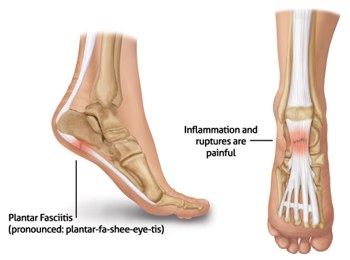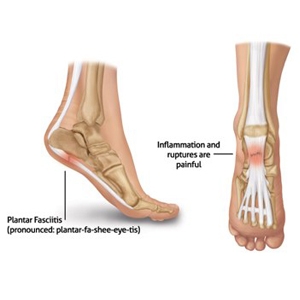
Plantar Fasciitis, pronounced Plantar fa-shee-EYE-tis, is the most common type of heel pain. The plantar fascia ligament on the bottom of our foot is like a rubber band that loosens and contracts with movement. It takes the brunt of our weight and pressure as we move. The condition occurs when the ligament tears, resulting in pain and inflammation. The pain of plantar fasciitis is usually located close to where the fascia attaches to the heel bone.
The most common symptom is a burning, stabbing, or aching pain in the heel of the foot that is most severe in the morning. This is because the ligament tightens up during the night while we sleep but as we step out of bed and put pressure on the foot, the pain can be rather sharp. The pain usually decreases as the tissue warms up, but may easily return again after long periods of standing or weight bearing, physical activity, or standing after a long period of sitting down.
Causes
- Overuse- Runners and other athletes often experience this because of the repetitive movements or excessive stress placed on the tissues. It causes inflammation that results in pain.
- Weight- If you are overweight, the additional strain of the weight on your foot can be the cause of the pain. Discuss a weight loss program with your doctor.
- Arthritis- Certain types of arthritis can cause inflammation in tendons, resulting in plantar fasciitis. This cause is particularly common among elderly patients.
- Wearing Shoes that Don’t Foot Correctly- If your shoes either don’t fit right or they don’t provide enough support or cushioning, your weight isn’t distributed correctly. This places stress on the ligament which causes pain.
Treatment
In most cases, plantar fasciitis does not require surgery to stop pain and reverse damage. However, starting treatment early on will decrease the amount of recovery time needed. Common treatments include:
- Rest- this is especially important if your pain is caused by overuse of the foot. Try to avoid running or walking on hard surfaces such as concrete.
- Ice- Ice can relieve the pain. Try to avoid using heating pads for the first few days because this can make the symptoms worse.
- Anti-inflammatory Drugs- Iboprofen, like Advil or Motrin, and naproxen, such as Aleve, can relieve pain.
- Stretch- Try stretching your foot before you step on it in the morning. This can help with lengthening the ligament before you put weight on it.
- Shoes- Make sure your shoes fit well and provide good shock absorption. Athletic shoes with a cushioned heel usually work well.
If after a few weeks the symptoms do not improve, we recommend scheduling an appointment to see your doctor.






